Who’s going to win and do you really want to know? The problem last year was that it was all too obvious too early rather. Ideally this would all come down to the final moments of the final mountain stage, a showdown over the top of the Col de Joux Plane and the toboggan run down into Morzine.
Two riders stand out in Nairo Quintana and Chris Froome but the route will reward others and the irregular climbs and several downhill finishes mean it’s as much a test of W/kg as a test of nerves. Here’s a look at the contenders and pretenders for the 2016 Tour de France.

Route Summary: before the contenders and pretenders, a quick reminder of the route. An opening start by the sea, bracing for the sea breeze and high stress for the riders as everyone fears losing time in the crosswinds. The race then heads south with a stage in the Massif Central mountain range to shake up the race. The Pyrenees come before the Alps but for a change the route uses more of wider, steadier roads in the Pyrenees while the Alps feature several novel roads that are steeper and more irregular. In between there’s Mont Ventoux, famous for many reasons but ignore the myths and it’s very selective with 15km at 9%. It’s chased the following day by the first of two time trials. The first climbs in places but has very fast sections elsewhere to reward those able to turn a 56T chainring; the second climbs almost all the way and has some tortuous sections to break the rhythm. There are several downhill finishes designed to disrupt the usual tactic of riders holding back until the final kilometre of a mountain stage. In short it’s mountainous but varied, we’re unlikely to get repeat episodes each day in the mountains and the race should be all the better for it.
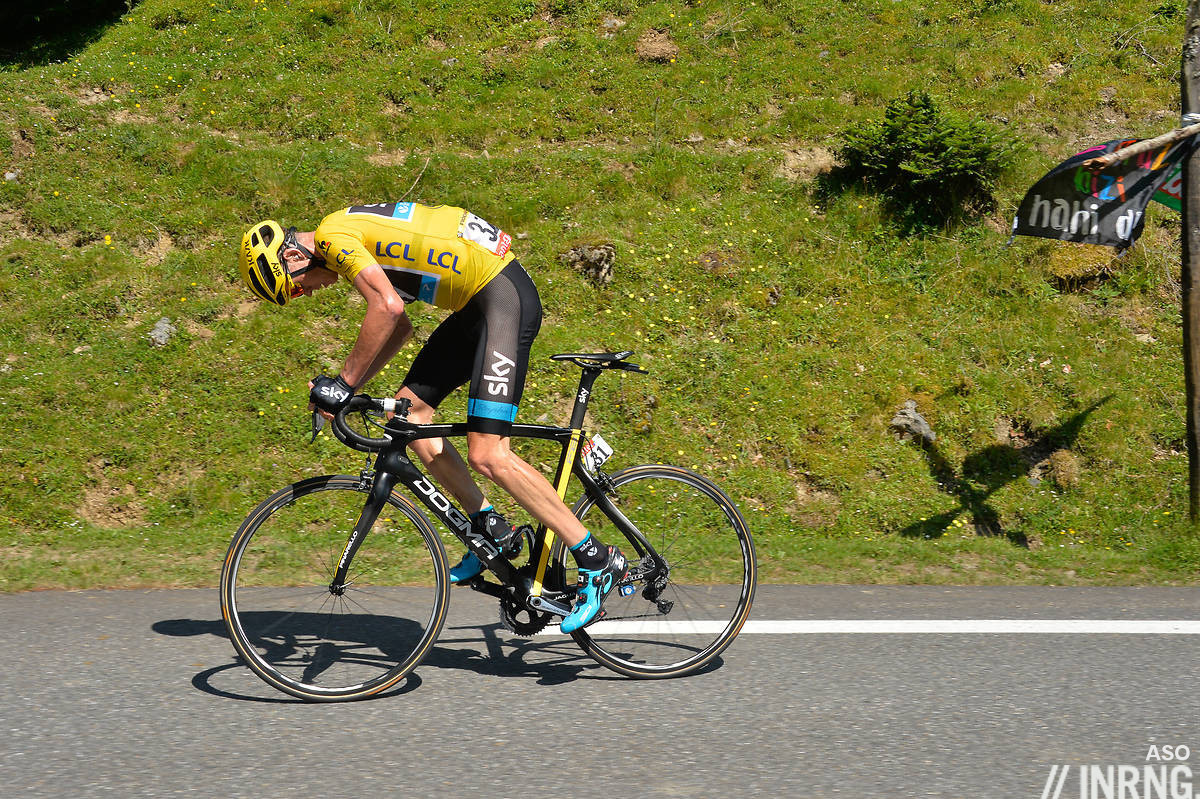
Chris Froome is the prime pick. Last year’s route saw the strongest teams grab control of the race on the opening stages, grip it tighter still after the team time trial and then Froome got a stranglehold on the maillot jaune in the first summit finish at La Pierre St. Martin and led until the end. This time he’s saying it’s all about the third week but his rivals must watch out for an early knock-out, he’s looking as lean as ever and weighs a reported 67kg. He’s finally shown good form at the Critérium du Dauphiné after an early season that lacked the usual winning streak. He’s just ahead of Nairo Quintana for the assurances he and his super-team bring for the opening week it’s flatter stages; also if the Colombian got the better of him last year it was because Froome fell ill. He’s like some colonial official from a Kipling story, polite and cautious in social circles but vicious and steely once he starts pedalling those oval chainrings and while Team Sky have a reputation for calculated – read boring – riding he’s been known to attack at will. He climbs with the best and among this group he’s arguably the strongest for the time trials. Geraint Thomas is being spared the team duties to make his own challenge for the GC but there are questions over his form, his performance in the Tour de Suisse was better last year than this time and if he was ill this year then surely he would have been pulled out just as Team Sky took out Leopold König. Mikel Landa is probably Plan C, watch to see if he sits up during the early stages or whether he’s a protected rider too, he’s surely there to help Froome but by virtue of riding alongside him can finish high.
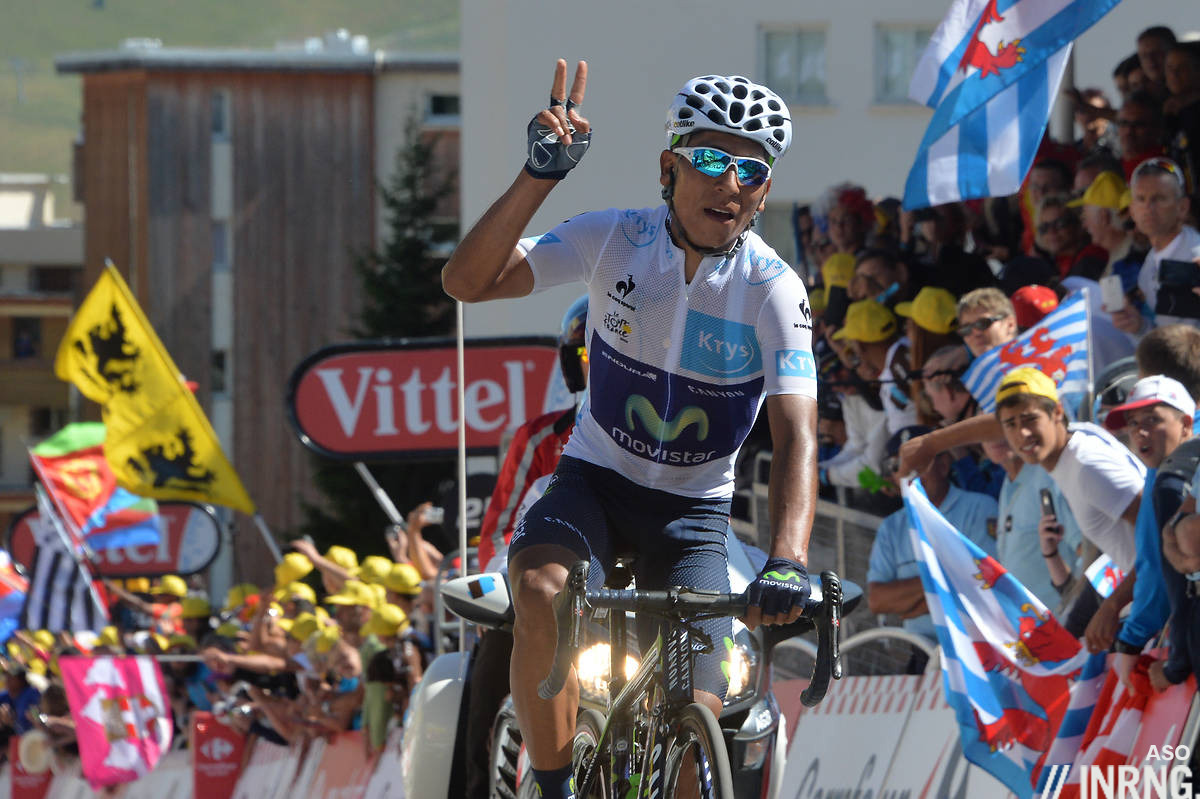
Nairo Quintana is the voodoo chile who chops down mountains. There’s still an air of mystery around him yet he’s a simple and humble character from rural Colombia, he’s got his feet on the ground but it’s at 2,700m above sea level. He came so close last year, arguably that route suited him more even if he lost time on the opening coastal weekend. He’s had a good season this year winning the overall in the Volta a Catalunya and Tour de Romandie and recently taking the Route du Sud. Movistar bring a very strong team but lack the Flahute rider who knows which way the wind blows on the flat stages. Even if he can avoid time losses on the sprint stages Quintana is likely to surrender time to Froome in the Stage 13 Ardèche time trial. For him it’s all about the Alps in the final week, a succession of tough stages on some of the smaller, twisting, steeper climbs in the Alps where it will be hard for a team to control events. Alejandro Valverde rides in support but this has to be seen to be believed, his quest for stage wins and honing form ahead of the Olympics might see him easing back at times too.
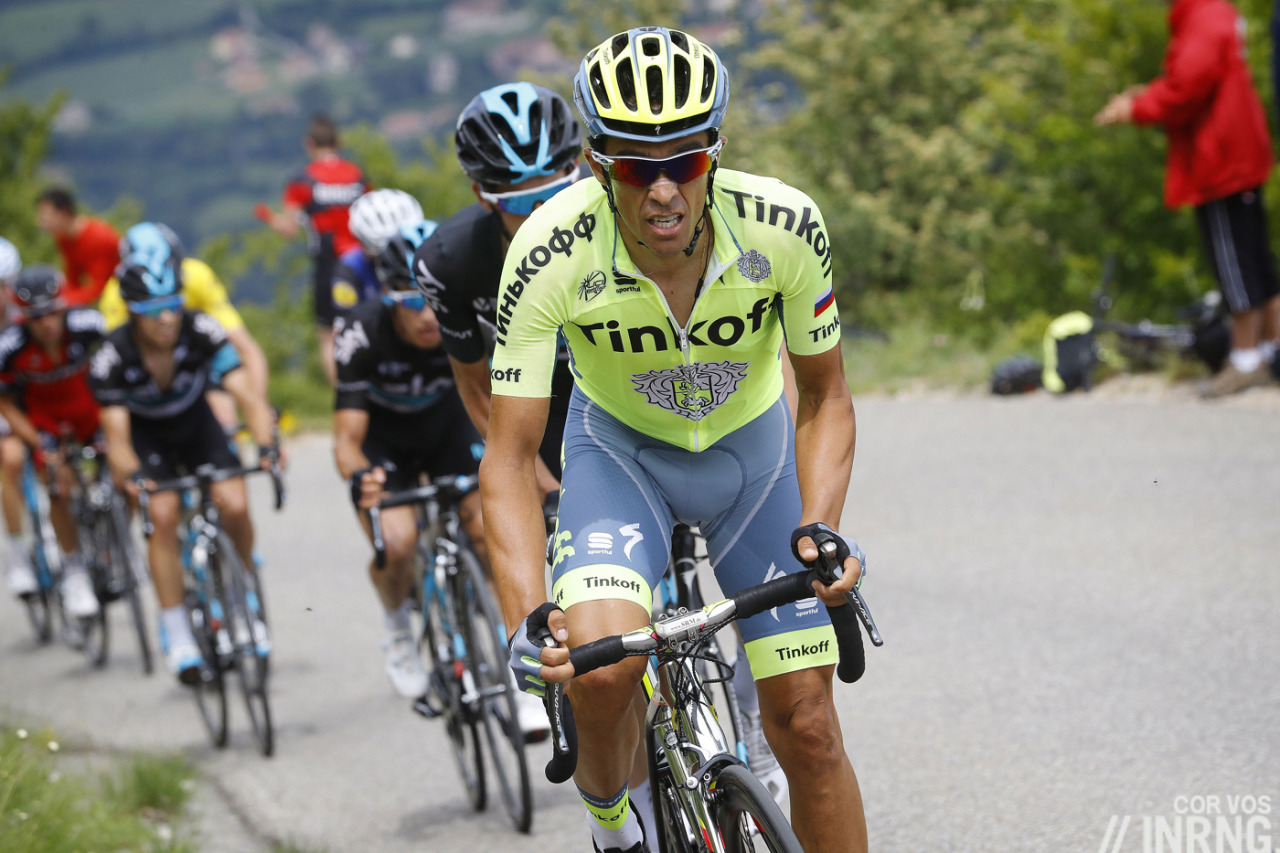
Alberto Contador is having a great year already and it shows in several ways. He seems more relaxed and more willing to chat in English. His results have picked up and he even won his first time trial in ages on his way to victory in the Tour of the Basque Country, granted that was mountainous but his ride in the Giro last year shows he can cope fine with rolling courses too. He was beaten by Froome in the Dauphiné and this is the main concern, his repeated attempts to get away could not work. There’s been talk of illness recently too but he always skips the Spanish national championships. He does share the Tinkoff team with Peter Sagan but their interests can coincide, both need to keep out of trouble on the flat stages and besides most of the team is dedicated to Contador but if he has the quantity, the quality isn’t quite what he’d want. Still he’s experienced and has a mental toughness few possess. Best of all he can win even when he’s losing, others may try to defend a podium or top-10 position but Contador rarely settles for safety and is prepared to launch long range raids to reverse the situation.
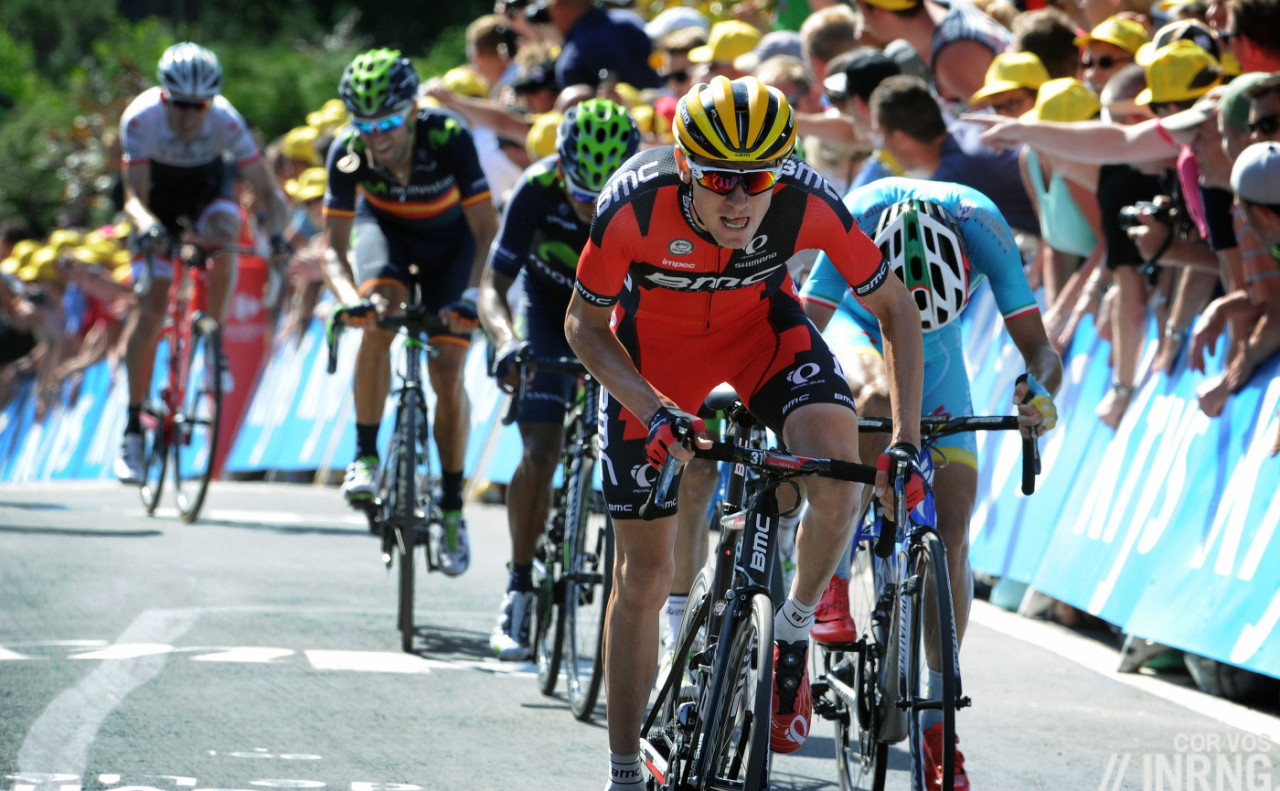
Richie Porte and Tejay van Garderen form a double-act for BMC Racing. Like it or not everyone wondering who comes out on top and you can bet they’re tired of it already. While Astana’s leaders actually had separate altitude training camps BMC’s duo have spent time together training and reconning stages in the Alps. They’re different riders, Porte is punchy and van Garderen steadier but both are tactically conservative and use the effective method of following for as long as they can and if they have anything left attacking late in the stage. Van Garderen tends to be the steadier rider, good on the long and steady climbs and his is still a story of progress, he is improving every year, 5th overall in 2014 and sitting 3rd until he fell ill late in the race last year. For him a top-5 would be satisfying and the podium a joy, especially as wins are rare. A stage in the recent Tour de Suisse broke the drought but only following a collapse in the cold on a previous mountain stage which meant he was afforded more room by his rivals.
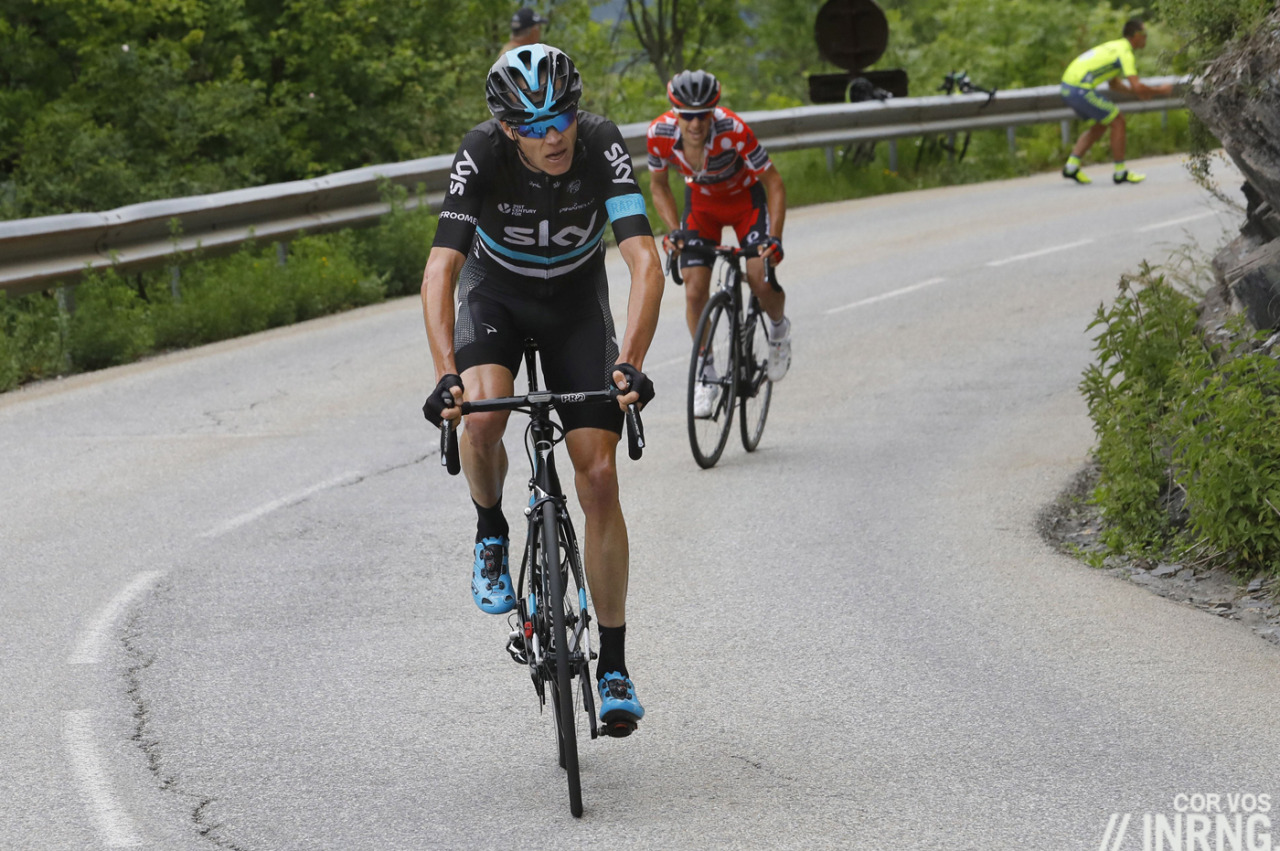
It’s perhaps telling that in trying to find a photo of Richie Porte for this piece many show him behind others, like the one above or another from Paris-Nice. He’s a strong contender for the podium yet amazingly he’s still trying to improve on 7th place in the 2010 Giro, his career best finish in a grand tour. Since then he’s either taken one for the team, a dreaded jour sans ruined his chances or he just lost his flow. He’s been a formidable one week stage racer and on a good day he can climb as well as Froome, is punchy for any time bonuses and excels in hilly time trials.
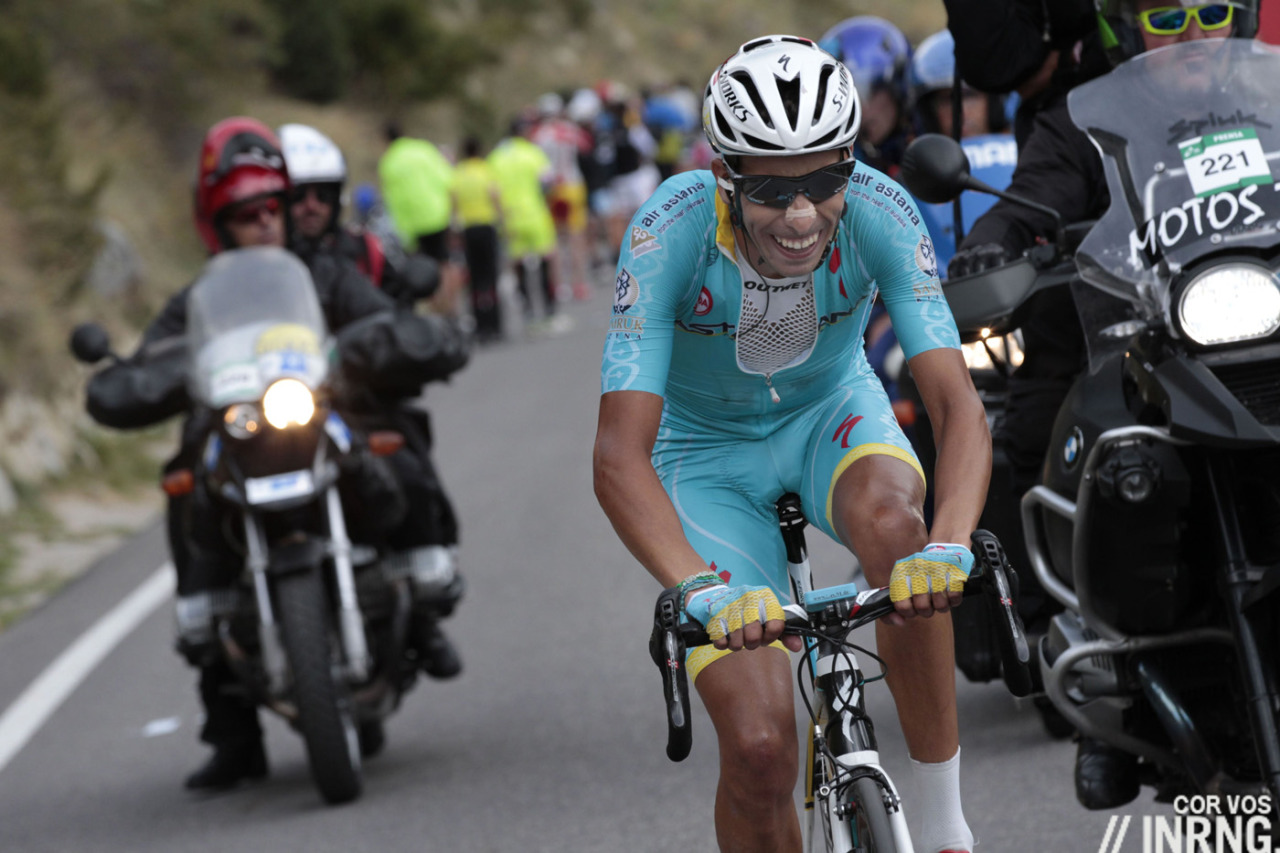
Now for the other double act with Fabio Aru and Vincenzo Nibali. This is Aru’s first Tour de France after second in the Giro and winning Vuelta last year. Success in the Tour sounds like the logical next step but the Tour isn’t just a step up, it’s a new storey. He’ll find a route that suits even if the Ardèche time trial won’t. He’s often exciting in races, at least in the mountains where he’s willing to attack. Form is the big question, he’s had a poor season so far and showed up at the Dauphiné to get dropped on the mountain stages; his stage win was in spite of his climbing form. Since then there’s a 40 day window to improve before the Alps arrive but he’s got a big gap to close. That said Astana did this in 2014 when Nibali went onto win the Tour.
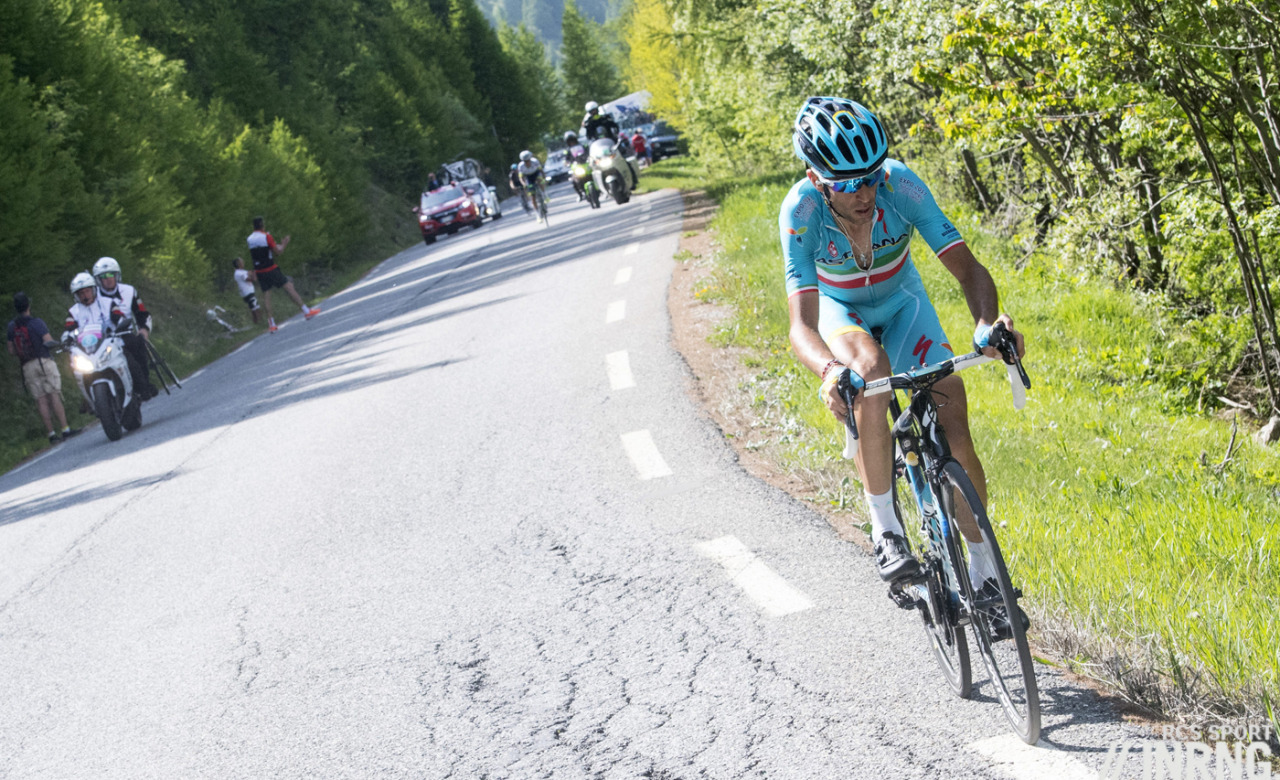
Nibali – now without the Italian tricolore jersey – triumphed in the Giro like one of Napoleon’s lucky generals: he held on while his rivals fell away and fell apart. He wasn’t even sure about riding the Tour but his win has given him a free hand and he’s eyeing the Olympic road race too. He’s leaving Astana and sometimes departing riders can get benched by teams but he and Astana management alike both have an interest in cooperating. This time the pressure is off and a Giro-Tour double seems hard given the opposition but a stage win and perhaps some risk-taking on the descents to take stages and stir up the race would be good. The flipside of this daring is that he can flop too, his attacks and gambles cannot always work. He’ll enliven the race. Jacob Fuglsang can ride high too but he was given his chance in the Giro and it’s back to team duties now and he’s just one of several imposing team mates.
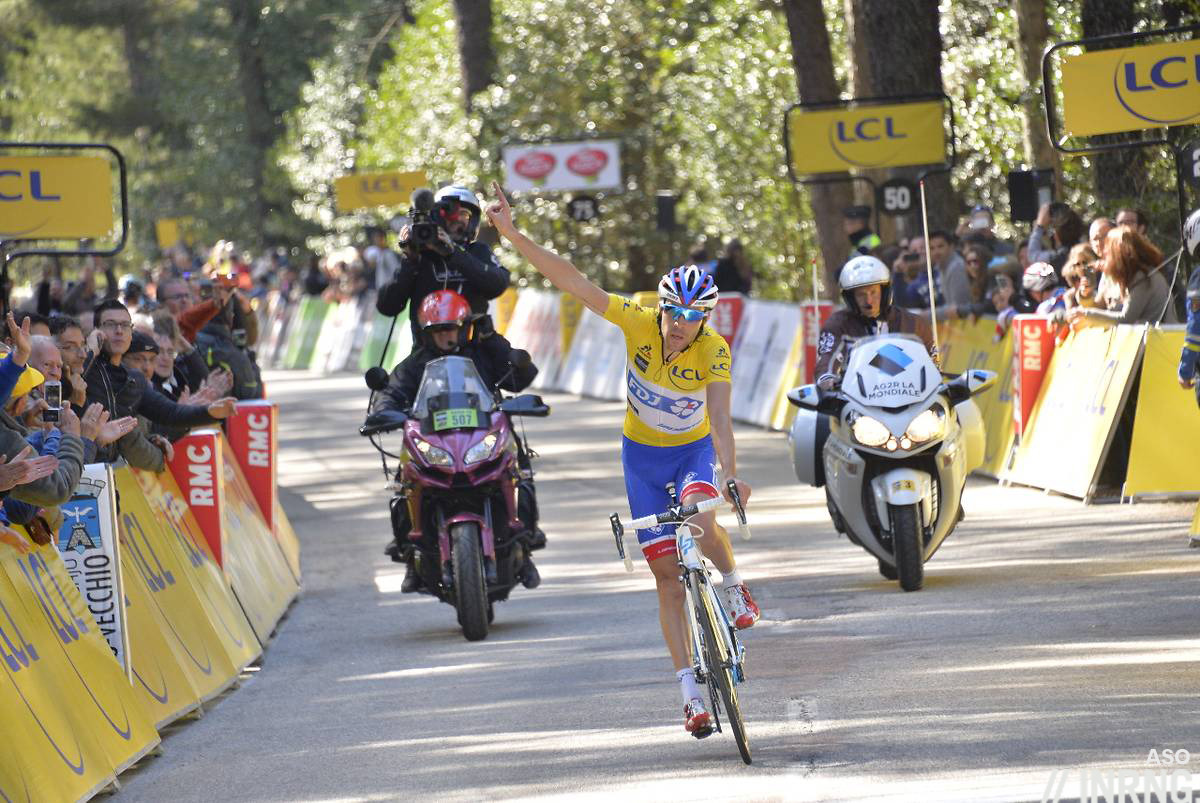
Thibaut Pinot‘s story this year has been one of improvement, his climbing and his time trialling keep getting better and he’s now among the best stage racers in the world. His stock’s been rising all year but there are doubts about his form. He was off the pace in the Dauphiné and if he won the time trial title in the French championships his biggest rival that day was the heat rather than another cyclist. In the road race he told his friend Vichot to attack because he was not feeling his best. In other words he’s been having some off days recently and the story of his rising trajectory all season could be ending: was June about turbulence or has he stalled? He’ll hope to come good but remember nobody’s form peaks in the third week, instead it’s just a story of managing the catabolic effects of a grand tour better than others. In short he’s a top rider but his rating below gets discounted because of questions over his form.
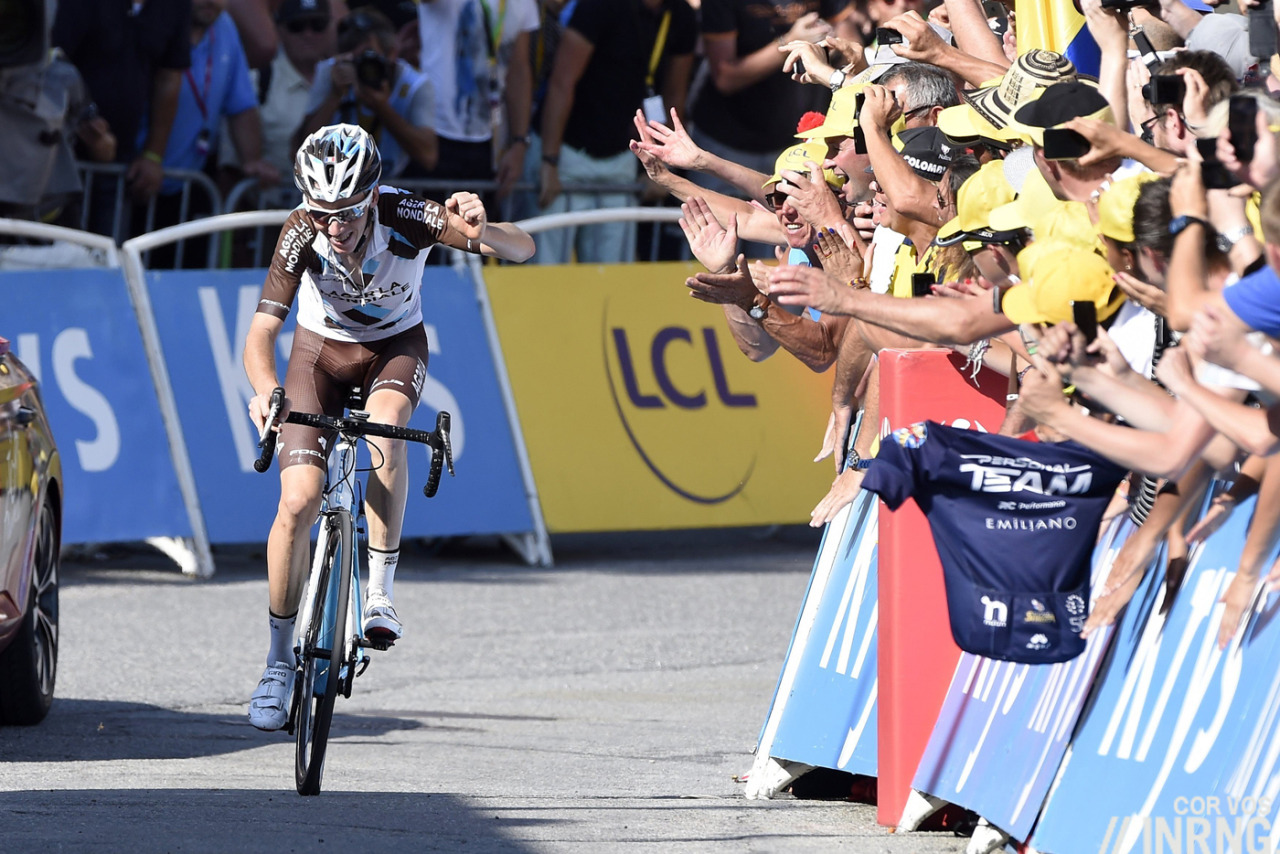
Romain Bardet had an excellent Dauphiné, even climbing with Froome and Contador on the tough Col du Noyer and there’s a course to suit him. Ag2r La Mondiale are a strong team when it comes to attacking but can they be disciplined enough to keep him out of danger in the first week? There are other risks, has he hit peak form already at the Dauphiné? He’s also a risk to himself sometimes, the Masters student is analytical and reflective off the bike but during a race his lizard brain takes primacy and if this means bold descending and lively racing it can mean tactical mistakes in a contest where saving energy counts. He’ll also pay a price in the first time trial stage. The team would surely sign up today for a top-5 overall and a stage win along the way but the perfectionist Bardet may not settle for this.
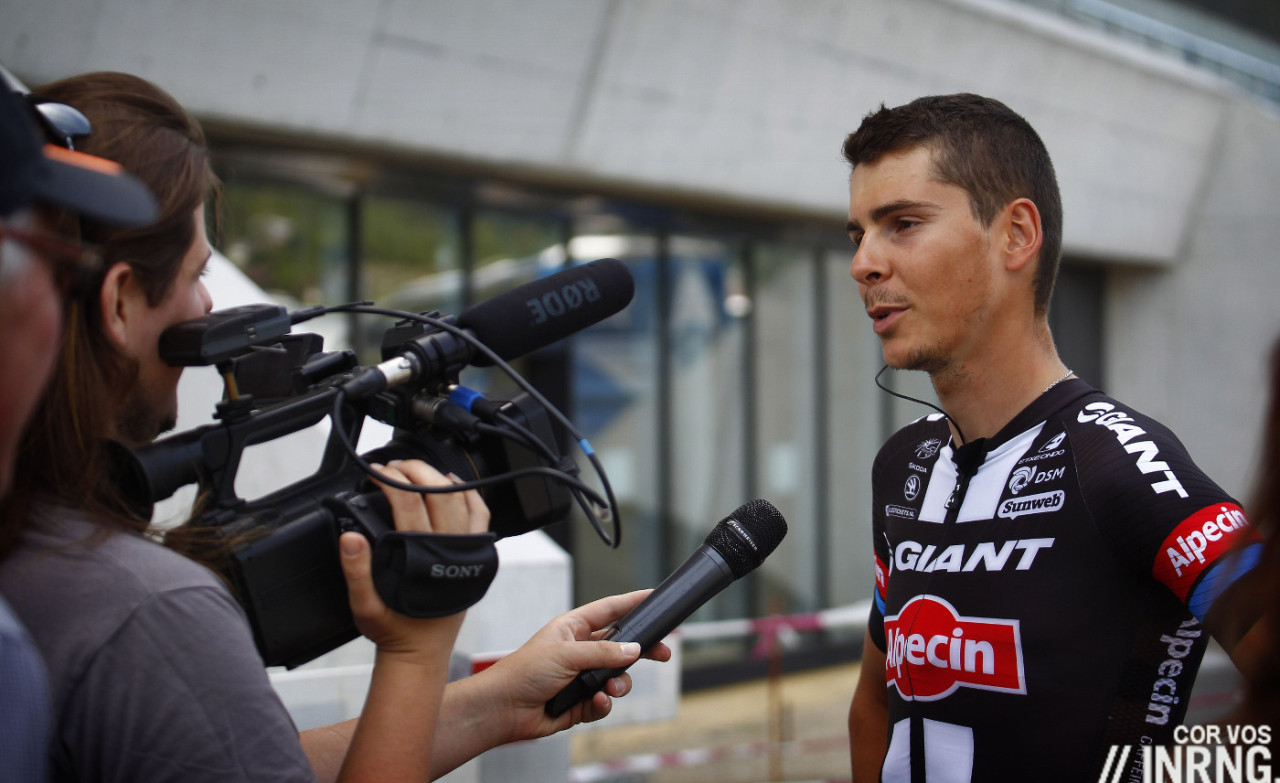
Warren Barguil completes the trinité of home riders. Just like in Switzerland he’ll concede time in the longer time trial stage but will enjoy the mountains and race aggressively both uphill and downhill. He’s just 24 and leads Giant-Alpecin and is aiming for a top-10 overall and the white jersey.
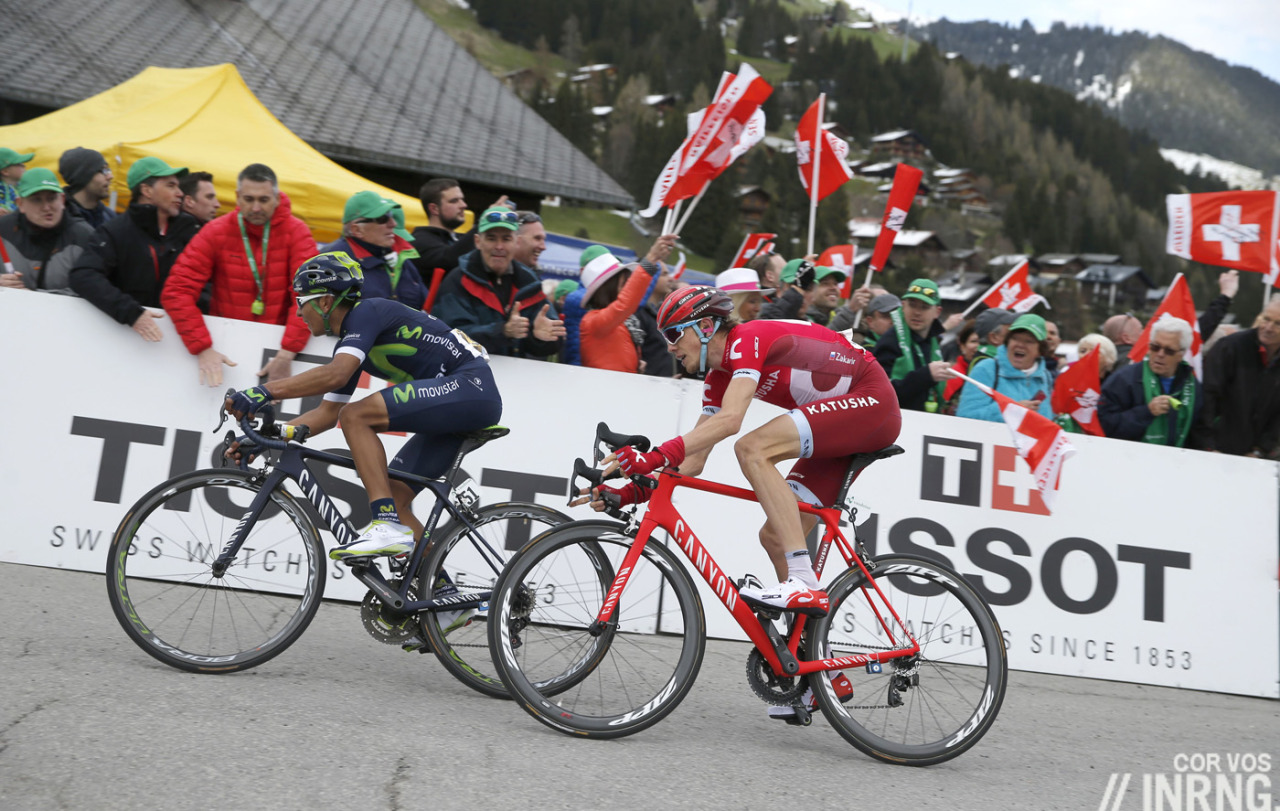
What about Ilnur Zakarin? He was riding to a Giro podium before his horrific crash on the Colle dell’Agnello and has been one of the few people in the world to match Quintana uphill this year; yet the bookmakers have him at 200-1. The odds seem wrong even if his chances of a podium look improbable; he’s recovered from injury but this is hardly the approach needed to the Tour but he could be good for a stage win. Jurgen Van Den Broeck has joined Katusha following a divorce with Lotto-Soudal over the winter and he’s placed high in the Tour before but is one of those stealth riders who can finish between 5th-10th in every mountain stage and therefore ride high on GC. Katusha’s third prong is Joaquim Rodriguez but he’s not looking as sharp as before, a repeat of his third place overall in 2013 seems most unlikely.
Pierre Rolland‘s failures and fightbacks have become a meme for French fans and he’s been announced as the next big thing in French cycling several times over during his time at Crédit Agricole, Bouygues and Europcar. Now he’s riding for Cannondale and an increase in performance is expected; it’s not hard given no staff at Europcar knew how to read a power file. Rolland has spent time at Tenerife and invested long hours on the time trial bike. The result? Not much so far 10th-25th place overall in the stage races so far this year but he’s often been a hero of the third week in the Tour so we’ll see if he can come good in the Alps, he’s certainly looking leaner than ever. Team mate Lawson Craddock seems strong and promising but this is bound to be a learning experience.
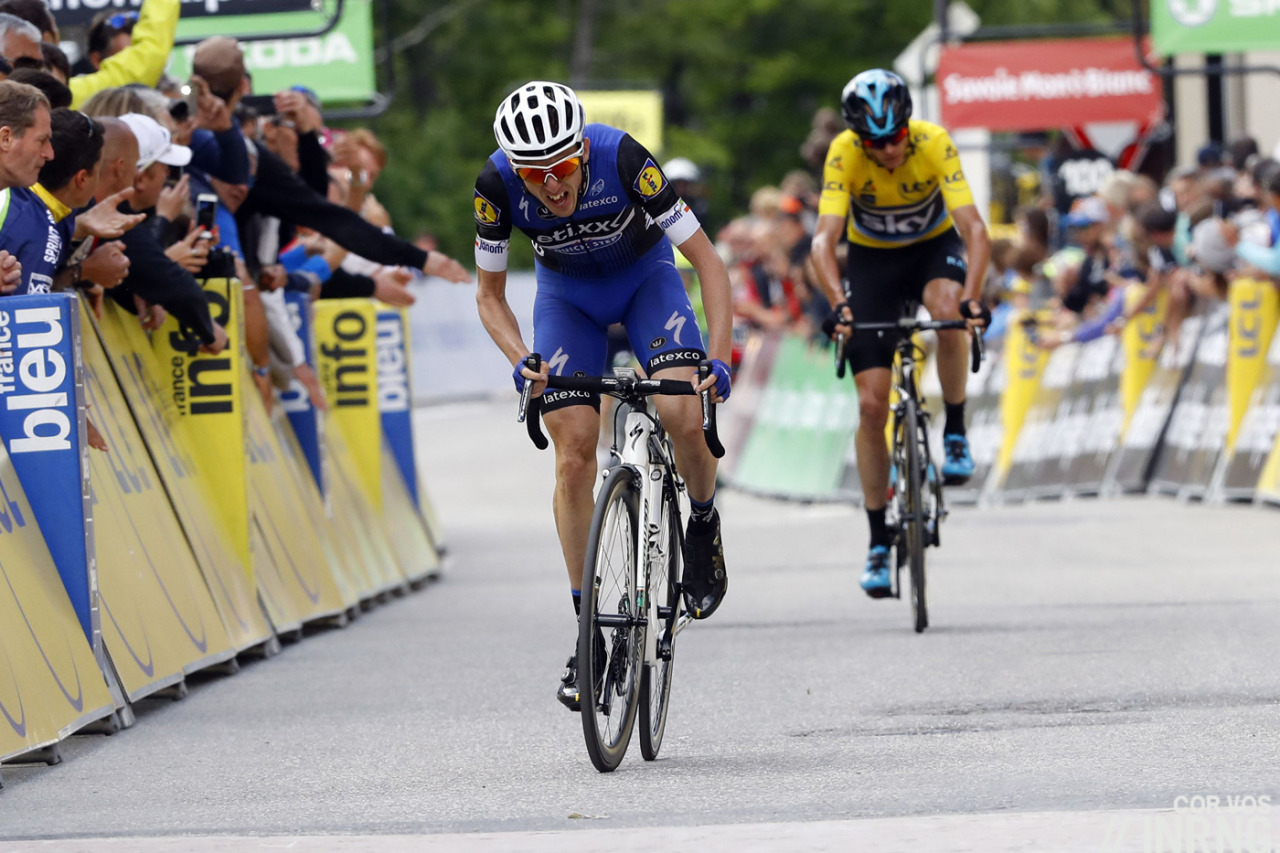
Finally some more names in rapid fire. Dan Martin was looking great in the recent Dauphiné but is still uncertain to hold it together for three weeks, a stage win or two would surely delight him. Adam Yates will challenge Barguil for the white jersey and go stage hunting too, he was active in the final week last year which is always a promising sign for a young rider’s future. Bauke Mollema was 7th last year but tends to ride for 7th, doing his best of course but that means recognising his limits and riding to them. Fellow Dutchman Wilco Kelderman at Lotto-Jumbo showed some more flashes of talent in the Tour de Suisse but also some fragility too but he remains a classy rider if he can hold things together and another white jersey contender. Rui Costa had a solid Tour de Suisse but is bound to find the likes of Froome, Contador and Quintana too hot to handle and more likely to cruise around in search of stage wins. IAM’s leader Mathias Frank made the top-10 last year and could climb back here.
| Chris Froome, Nairo Quintana | |
| Alberto Contador | |
| Tejay van Garderen, Richie Porte | |
| Romain Bardet, Fabio Aru, Thibaut Pinot | |
| Kelderman, Barguil, Yates |

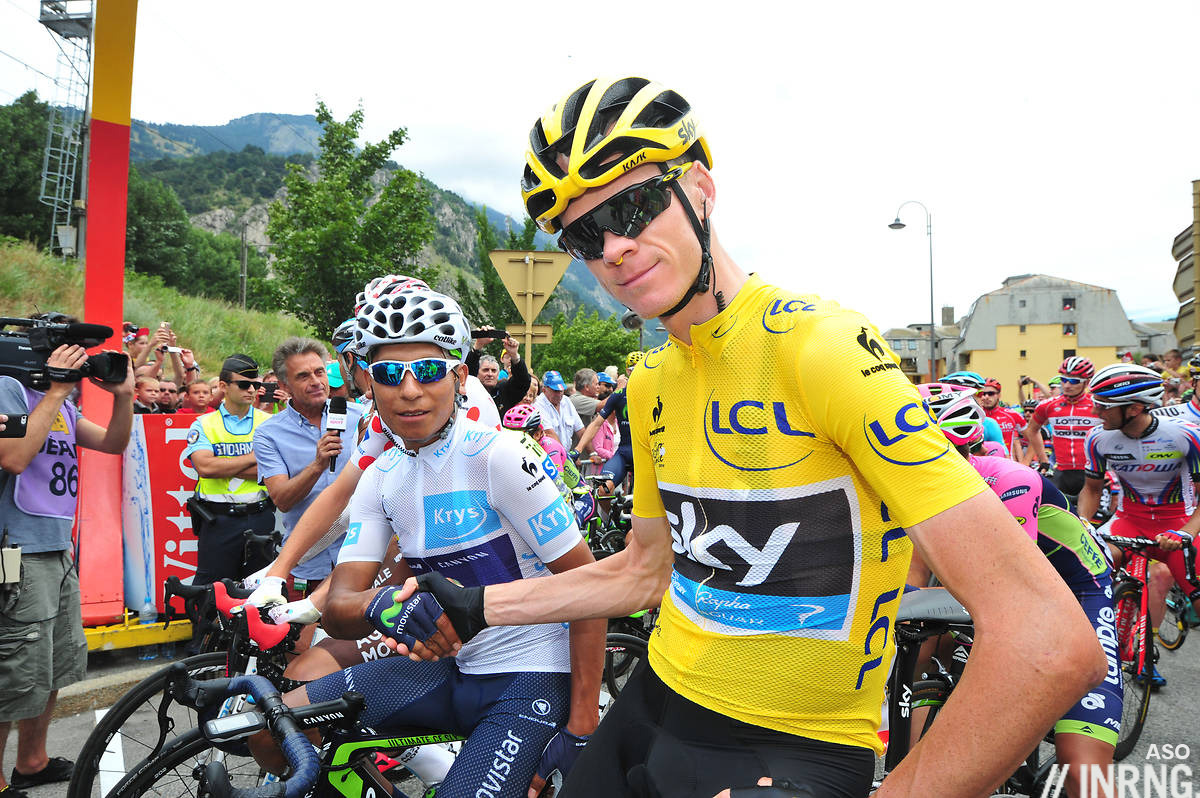
I have Froome and Quintana too close to call. It may depend on if Quintana can stay close until the second rest day. If so, most would see him pipping Froome on the final peaks. But any repeat of a Froome destruction of the peloton earlier in the race (Arcalis and Ventoux come to mind) and it could be a more familiar story.
I left it out to save for upcoming previews but it could depend on the weather, tall thin riders tend to fare worse in the cold and wet compared to short, stocky ones and vice versa. It’s a function of the skin surface area.
true that, it’s not kenyan summer in France this year !
I had to have a look to a dictionary to understand the word Flahute 😉
Yes, but of course the same principle of skin surface versus temperature applies to heat as well.
Yeah – I don’t think it’s correct that tall thin riders are better in the heat. Trying to remember the exact science from David Epstein’s book – The Sports Gene – but pretty sure he sets out that the reason Paula Radcliffe was never able to replicate her record setting marathon form in big summer events was due to the heat and the difficulty people with larger surface areas of skin have in regulating their temperature.
It’s surface area:volume ratio.
For example, an elephant has a lot of volume compared with its surface area (because it’s round-ish). Therefore, elephants have a lot of difficulty losing heat – hence the big ears, which act like radiators to cool them.
The fatter you are, the hotter you are – and that, of course, includes the insulation you get from the actual fat.
However, I would have thought that the difference between GC contenders in their SA:V ratio would not be significant enough for their bodies to deal that differently with heat regulation.
As we know, some riders tolerate heat/cold better than others and although a bulky rider will cope better in cold than a skinny rider, there are probably many more factors involved in these differences than just their respective sizes.
Fat content probably plays a far bigger part: riders like Quintana, Contador and Nibali look a more normal size and all tolerate the cold well, whereas Froome has clearly reduced his body fat to a huge extent. This lack of fat can mean he gets cold too easily (and can compromise the immune system). This thing of not being naturally skinny probably explains TVG’s and Porte’s performances in cold/susceptibility to illness.
How can Froome and Quintana be too close to call? They have done the Tour against each other twice, Froome has won twice. The route couldn’t have been more suited to Quintana last year. I’m no Froome fan, and wouldn’t mind one bit being proved wrong, but that’s the facts of the matter for me.
Nairo “crashed” early in 2015. Lost 2 mins. That was the big luck for Froome as he’s poorer climber and these 2 mins were the key …
A few points: Cyclingnews reports that G. Thomas has abandoned his GC aspirations and will be all in for Froome after his TdS disappointment (which you note). Second, “chile” is the spelling of a pepper in many places, although maybe that’s a typo. I do apprecite the Hendrix reference though. Finally, I would argue that Imanol Erviti is the “flahute” type to help guide Quintana on the flatter, windy stages.
+1 to all that
well, there’s Voodoo Chile and then there’s Voodoo Child (slight Return) which is the one about chopping mountains down with the hedge of your hand…scuse me while I kiss this guy
Excellent, just thought, I must read too much Inrng as the star rating was exactly what I expected. Maybe Nibali might have warranted a star or two, can you really say he’s not as likely to win as Bardet or Pinot?
Wonderful writeup with your usual Hors Categorie analytic quality.
Just to note that Aru has not won the Giro (yet?)- He was beaten into 2nd in 2015 by Mr Contador 🙂
It certainly will be good to see Alberto take this race on with fresher legs in 2015 or 2011, and hopefully without the crash he had in 2014. I hope that his legendary ability to hit his peak form and maintain it through the 3rd week of a GT holds true here given that the course suits him.
Based on the Dauphine, I am *hoping* that Contador has room to improve, while Froome is already at his max- If they have BOTH improved since then Contador will have his hands full especially given Froome’s ridiculous team of GT stage and classification winners, monument, World, Olympic and National champions (and secondees from BMC)…
Personally, I won’t be upset with a Quintana win (provided that Valverde plays ball), but will be far less enthused with another Froome/SKY race asphyxiation, even if I am forced to grudgingly accept its effectiveness and his results…
Thanks again and let’s see how the TdF shapes up, yes?
Cheers!
Aru looks like a bit underrated (how many riders who appear in your list below the four-stars level do have a palmarés which can match his?), but I’d agree that being his first Tour experience he might botch it. When compared with other riders, I wouldn’t mind *specifically* about his lack of performance until now: very sadly, it’s the way they’ve been working for the last couple of years. I don’t like it, but that’s something you must take into account. Froome’s Dauphiné performance would have appeared simply impossible if you just looked to his season until that moment.
A bit harsh Gabriele. Froome had a mechanical with 21kms to go on stage 2 of the Tour de Romandie and he rolled it home since it was pointless to chase back. If that had never happened he would clearly have been contending for the GC there. As it was he still won a stage with a breakaway. He is also the most lightly raced GC contender. Some people like to point out his “failure” at Catalunya but Froome hates rain, which always happens there, and cold which always happens there as well. You are never going to see the best of him in March in the wet and cold. Its my contention that its June and July when you judge him. In contrast Aru has not threatened a GC podium all year. A win for him in the Tour would literally be from nowhere in terms of this year’s form.
Sorry but… what are you talking about?
Froome actually *tried* to chase back, and wasn’t ever that far back, he was nearly immediately amidst the team cars. He pushed hard, he was even doing his respiration thing, but despite the slipstream of the cars he struggled to get back to the peloton, which was riding a good tempo but still included some *eighty* riders or so. He finally got to the peloton, but then cracked and lost contact again.
He went on chasing again and was still pushing to get to the group when the climb was ending, but IAM’s rhythm was making him suffer. Apparently, it was only after not making it back during the descent that he decided to simply quit.
It was enough to see that stage to understand that he was hardly in the conditions to make a top-10.
I’ll acknowledge that he was probably working on other skills, as his stage victory proved, when you thing about the way he went for it (if you’re *really* among the best and you’ve just lost time because of a mechanical, or even a bad day, the logical approach to stage winning isn’t attacking from far, but staying with the best and then going hard in the last kms of the last climb, when nobody is marking you that much ’cause you’re back in GC, see Tejay in Suisse).
Froome didn’t race much and when he did he was hugely under par (I won’t consider de HST, anyway, that was way inferior to any Route du Sud)… until the Dauphiné.
Though, we know that we can see big changes in form from him, and from several riders who race – or, sadly “started to race” – like that.
What can be true for Froome, might be true for Aru. However, I wouldn’t ever argue that you can expect Aru to really *win* the Tour, even more so being his first time there.
I’m just saying that, as several other riders (including Froome) showed, his previous results this season don’t mean much, given the way he’s quite clearly been racing and preparing himself.
quit = give up the chase (obviously enough)
I actually started off with him on a lower rating given his struggles this year but bumped him when thinking what he is capable of in the mountains and the idea that even if he’s been quiet so far Nibali did the same in 2014.
Like RonDe says Froome had some bad luck in Romandie which meant we never got to see the direct comparison.
It’s pretty evident that RonDe didn’t watch that stage 😉
Froome just blowed up when he had to perform an unexpected – albeit very limited – effort in the *wrong* moment of the stage. Which says a lot about his characteristics, but also about his form in that moment.
I wouldn’t worry unduly about Aru’s form.
Last year he was terrible from January-March, disappeared for April (reportedly because of a stomach bug that fortuitously stripped significant weight off – but notably also sidelined him from training), then rocked up to the Giro in May and rode strongly and aggressively for 3 weeks.
If anyone can miraculously turn their form around it’s him.
I agree with your general concept, but are you *really* speaking of the 2015 Giro when you say that he “rode strongly and aggresively for 3 weeks?”
He’d been struggling from the 11th stage on (when he didn’t lost time but Contador commented that he noticed something and started attacking him from the following day in Vicenza), barely defending himself until the last couple of mountain stages, when he had recovered a bit but still the team had to ride specifically in order to have him winning, because he clearly wasn’t on the top of his game.
He was reportedly suffering from sort of a celiac disease, but truth is that we can’t really say that he showed superior or consistent form, whatever the reason, during that Giro.
you’ll find that Aru only one the Vuelta last year, not the Giro
*won
You’re right, will fix the above and this comment will self-destruct a bit later.
To finish first, first you must finish. I won’t be making no bookmaker rich!
Very good analysis. Quintana´s form is a bit of a question mark for me now. Either way, Froome seems the unbeatable pick for this TdF. The guy can climb, TT and command a team. And he knows what it takes to win a GT, specifically the TdF. Oh, and he´s cadaveric-skinny too, as usual. That´s a tough, tough mix to beat in the “new cycling” era.
I will now never know, what your answer to the posed question is, because I stopped reading when I came to the by now ritualised, usual “Valverde is such a bad, selfish person” stuff. Tired of it.
A bit of a caricature, he surely enjoys an elevated status in the team, he’s said he wants the freedom to go for stage wins which by definition means he’s not alongside Quintana.
It is hard for me to remember instances where someone has won a significant one-day or stage-race with Valverde on their team. Oscar Freire at the 2005 Worlds?
Think it’s rare Valverde has broken his word, when he wants freedom he’s usually much vaguer than he has been about this.
Do you have a linkable source for the stage wins thing?
I didn’t believe it until I saw him ride for Quintana last year. Did a good job
A pity that the team was riding for him all the Tour long and made Quintana lose his final victory option. Not that good a job.
How exactly? I am at a loss to understand what Valverde could have done differently to help Quintana win last year. Whilst he is a good at hanging on in the mountains and accelerating in the last few hundred metres I have never seen anything from Valverde that suggests he could ride on the front and get rid of the Sky train nor go on a Contador style long range raid – I just don’t think he is a good enough climber. Given Sky climbing strength in depth (from a bigger budget than Movistar), even total sacrifice from Valverde would most likely result in Froome still having teammates with him. Quintana lost the Tour because he lost time in the cross winds and in the first mountain top finish- neither of which can be blamed on Valverde.
Valve gave everything, he’s even put aside his third place overall and tried to ride for Nairo
Movistar rode to ensure that Valverde took a podium.
Had they focused entirely on Quintana taking the victory – and encouraged and helped him to attack further from the finishes of the last few stages – Quintana might have won.
Just one of many examples in cycling where nationalism triumphs over good sense.
They could even have not forced Valverde to work for Quintana, but had the rest of the team do so.
That’s me blaming Movistar, not Valverde.
@Chris
During the last week’s multi-climb mountain stages, they were riding slower than they could to prevent Valverde from falling back. Quintana even stopped a medium-range attack because of that.
Froome typically tended to suffer when forced to ride strongly before the last climb, even more so during the third week. Truth is that after LPSM (where more than half of the work was done by Movistar), Team Sky went on the front to lower the climbing pace more often than not.
If Movistar wasn’t worried about dropping Valverde, they could have put greater pressure on Froome… who already ended up losing time despite a favourable distribution of the effort, imagine if they had put him in a less comfortable “strain zone”.
Have you actually got evidence of that? Movistar riders on the record confirming that was the case? If so then fair enough- I don’t speak Spanish or Italian so may have missed it. But that wasn’t my interpretation of the TV coverage. If one team can afford to buy the level of climbing horsepower that sky can then unless you have stronger riders there is not much you can do on Tour parcours (the Giro parcours provides more opportunity). In those circumstances I would ride for two podium places as well.
Sorry, should be a link to the discussion with Gabriele further up the comments – too much beer watching the Wales game!
Hi Chris, perhaps that’s an error in the website because I tried to answer to your latest comment and my reply appeared as a separate post below. And I’m not even watching football 🙂
Thanks Gabriele, let’s blame IT!!
On team strategy, you can check the climbing times (the Plateau de Beille stage was simply incredible: Core and Lers were laughable, and so on, that wasn’t the only case); besides, just have a look at the pace or at the difference with the break or at the number of riders in the reduced peloton when, say, Astana was pulling comparing that when they stopped and Sky went on the front (for example, on the Tourmalet).
It was all quite evident on screen, but, as I said, you’ll easily find several climbing times on the web.
On reducing the pace to wait for Valverde, Quintana publicly said that in two separate occasions right after the respective mountain stages (about Glandon and Croix-de-Fer). English media commonly reported that.
“Alejandro suffered sort of a small crisis there and we had to ride more cautiously so we could get him back to the group and let him recover,” Quintana said.
And again:
[Nairo Quintana]: “When Nibali accelerated, Valverde wasn’t at his best, that’s why I eased up”
After LPSM, Sky was riding slowly on the climbs which preceded the last one. Quite obviously, and rightly so. They were riding the far-from-hectic pace their leader needed.
The other teams should have changed that script, and in order to do so they had the needed horsepower to go faster uphill before the finishing climb, especially if they had allied themselves to do so.
Anyway, waiting for Valverde wasn’t going to be a winning strategy, especially if what you needed was to raise the pressure far from the line, during that decisive third week.
@ INRNG
How do you feel are Valverde’s odds of finishing within the GC top 10? Like last year, even when he’s technically there in support of Quintana, he still seems to be likely to finish very high in the GC, do you agree?
He’s perfectly capable of it but does he want to? He might prefer stages and to back off in the mountains a bit to stay fresher for the Olympics, it’s hard to tell.
What’s the Europcar power meter file story? Or is that just hyperbole in respect of their budget?
It’s interesting how light-weight the Sky team are. The plan seems to be to match Movistar who crank up the chaos when the Tarmac goes vertiginous. It should certainly be an interesting tour.
After those first three stages are people expecting the sprinters to hang around for mucho mountain punishment? I have the feeling there will be quite a lot of breakaway success this year.
I can’t remember the source now but remember a discussion with riders/staff and this came up, it’s true but Rolland of course was working with his own coach and using power. Others though were not, some still measured training by distance ridden.
Thanks for the response. No Dan Martin then?
With Kiryienka, Thomas, Rowe and Stannard I think Sky are more than capable of pushing the power on the flat. Sky line up looks much more balanced than Movistar, especially as Kiryienka and Thomas can set the pace until late on the climbs too.
Thank you for the preview.
Quick Q. How many times has Frome ridden a dominant ITT since 2013?
I have Contador doing that at the 2015 Giro.. I’m just wondering if “Froome as the great ITT rider” is still a hangover from 3 years ago. Maybe I’m wrong.
Think Contador beat Froome at the 2014 Vuelta…
I know you’re a big Contador fan. Froome said he didn’t ride his TT bike much last year because he didn’t have to. The Tour and Olympics meant he’s had to, even if they’ll use TT bikes for only one of the TTs this year, the second one is too hilly.
Reading that excellent summary, what stands out is how strong the field is – marginally ahead of last year with even more strength in depth. Of course that’s no guarantee of good racing, but they can’t blame the parcours, which is also strong.
Over the couple of weeks I’ve been going through highlights of the last 20 Tours, and one of the things I noticed is that some years there’s just not that much depth of GC quality, although sometimes due to scandals and injuries rather than anything else. Maybe that’s it – nobody big has been banned in a long time… Some of the years like 2006 and 2011 with slightly weaker fields were pretty entertaining as there were no super-strong teams crushing the race (although CSC were super strong in 2008 and that was an entertaining one too).
Whatever happens, it’ll be very interesting to see the relative strength of the 1/2/3 chainring guys especially, and whether any of them can disrupt the holy Froome/Quintana/Contador trinity. Someone will be going home disappointed…
Local Swiss paper reported quintana and brother rode forclaz and emosson on last Saturday for second time. Significant? Let’s wait for the fireworks
In awe of the Hendrix reference. Looking forward to more classic rock references throughout the Tour!
Does anyone else think Nibali’s descending skills get over-rated? He never seems to gain more than a handful of seconds, but uses a lot of energy doing so.
On a related note, Froome seems to have perfected the art of never wasting a single joule of energy – he’ll watch others go bombing off the front, not respond, then suddenly turn on the gas and destroy the race. His ability to simply ride to his own fastest pace is becoming slightly disturbing…
He’s only won a monument using them, no biggie.
In all seriousness, probably yes. I think descending skills are only good if:
1. You’re good enough to have a decent gap over the top
2. You’re not good enough and can use them to get back on
You can gain time on a descent but often only it seems if your out of sight or you’ve lost touch. It’s very hard to accelerate out of a group on a descent and from that point of view they are probably overrated.
How many stages actually finish on a decent? The problem is riders can get back on if they work together on the flat following a decent – perhaps a stage should finish say with 1km to go of an 18km decent?
He just takes a lot of risks and sometimes it works out. On technique though I wouldn’t rate him the best by a long shot.
Who should I be watching instead, Netraam?
I would go with Sagan. Obvious but he really is very, very good.
Or Bardet. Last year’s Duphine was a thing to behold.
Well, they are better than Steven Kruijswijk’s… and that’s all that has mattered so far this year…
And he’s shown many times how good they are – right back to the Liquigas days.
The amount of time an outstanding descender can gain compared to a group of average ones depends mostly on the difficulty on the descent. And it also depends on how quick the descender can ride those others of his wheel since on the road a lot of riders manage to follow a good descender but once the elastic snaps they can’t keep up the pace that high. This shows how important the choice of the best line is and how much difficulty many riders have finding the perfect line. Get that right on a road with good tarmac and regular turns and you won’t loose much time no matter how hard someone more audacious tries to.
But if the road surface is bad or wet and some turns are more irregular than the more experienced and confident descender might gain some serious advantage and Nibali has already shown often that he’s that kind of rider although for the most part those stunts have happened outside of GTs.
What is up with Talansky?
Pulled out, sick. Lawson Craddock gets his first shot instead.
A bit short of form, he had an unspecified personal problem earlier this year which he said meant he’s been chasing his form and if his Tour de Suisse was good, he wasn’t ready for a grand tour yet. He’ll do the Vuelta. It’s probably good for all, he gets angry when things go wrong so if the form isn’t there but the pressure is that would not be good for team morale.
That photo of Aru makes him look like a Were-rabbit.
I’ve always thought Aru looks a bit like the Mouth of Sauron, from the LOTR movies.
If the reports of rain and crosswinds for the weekend are true then there could be a certain sense of deja vu. If it does turn out to be bad weather then out of the GC teams this is likely to be advantage Sky as they probably have the best team for those conditions, Rowe, Stannard and G are all accomplished classics riders. Nibali is certainly wily enough, possibly Berti too. It might well help Dan Martin as Etixx are the masters of this particular game (Cav’s victory in the crosswinds a few years back is particularly notable). Conversely I cant see FDJ or AG2R being in the mix in those circumstances, nor (as Mr Ring has pointed out) Movistar. If things do play out that way it really will put a lot of folk at a disadvantage very early.
Yes there are plenty of places on the route where minutes could be picked up but if Froomie gets a lead early (as he did last year), then chooses a stage (like Ventoux) which he nails, get the TTs right and uses the train to defend and it is difficult to see him loosing short of an accident or illness. Yes he probably isnt the best descender but if he gets the advantage elsewhere then difficult to see how the rest can knock him off his perch.
If it is pretty even going into the Pyrenees then things are more unpredictable though again the sheer strength of the Sky squad gives a considerable advantage to Froome. If, a very big if, it is all to play for going into Stage 19 then a long range attack could dislodge Sky as tiredness and mental exhaustion take their toll, though Froome did win the Dauphine last year on the climb up to St Gervais.
The only minor disagreement I would have with the ratings above is that I think Froome is slightly better positioned than Quintana (Froome’s advantage on TT is probably cancelled out by Quintana’s better descending), not on personal ability but simply because the team he has around him, not a huge advantage when attacking but a big big help when defending. Perhaps 5 rings for Froome and 4.5 for Quintana
While Froome and Quintana might be equally matched in physical abilities, in terms of mental fortitude, including aggression and self-confidence in the face of a challenge, I’d say that Froome takes the lead. Take for example the socio-political game-play of establishing oneself in the team hierarchy. Froome fought the pack leader, e.g., Wiggins, to earn his rightful place at the head, along with the respect of the pack, whereas Quintana doesn’t have what it takes to face off against the alpha-male at Movistar, namely, Valverde, who keeps running alongside him as the pack leader despite his age and inability to win a grand tour. Until he can shake this monkey off his back, Quintana will not win the Tour against Froome.
Hard to agree.
Quintana’s last year looked like a shared but at the same time very personal and deeply assumed choice.
What Froome’s 2012 frankly didn’t.
And he lost a huge quantity of respect within *the pack* because of that, as well as the rest of his telenovela with Wiggo. Or his failed attempts to go cannibal in the last stages of the 2013 Tour. Or his void menace (or aspiration?) of “going to the Giro”
Things later started changing for Froome and he’s apparently being building a steadier attitude, but you never know.
It’s curious how the personality of some sportsmen can change in a few years time (they’re young guys, after all): look at what happened with *tranquillo* Nibali.
Hoping “El Pistolero” can ride as well as he did in the 2015 Giro.
If so, this could be a three horse race.
I’m a bit over this “Quintana only gained time on Froome in TdF 2015 because Froome was sick” malarkey.
Froome should absolutely expect to get sick over the course of a 3 week Grand Tour in the condition that he presents himself. Having a weak immune system comes with the territory of 3% body fat.
It’s kind of meaningless to benchmark Quintana’s performance in the 3rd week against Froome’s peak level, when that level is inherently precarious and unsustainable.
+1 spacelab – to win a 3 week race you have to be strong over 3 weeks. Does Froome look a bit ‘bigger’ (all relative I know) this year? I wondered if that was deliberate to try and combat your exact point. Having said that Thomas obviously messed up the training/fasting thing before Suisse and paid the price…
Kind of agree, sky, so far (with Wiggins and Froome victories) tend to go hard on the first big hill top finish and build a cushion. then ride to a hard pace to stop attacks. Others rely on picking up the pace, Quintana seems to get relatively better within the race and come good at the end. – Nibali did this in the Giro this year (perhaps learning from when Horner did it to him in the Vuelta a few years back)
Building that cushion means it’s there and can be used at the end – and Froome is good at “managing” his rides.
Its a 3 week race and different riders will approach it differently, hit their best form (or peak resiliance) at different times but all serious contenders are looking to get the best time over all 3 weeks.
Great to read, as always. Being a football fan as well, a lot of the traditional build up to the Tour has passed me by over the last month, so this piece has crammed several weeks worth of excitement into to ten minutes!
Really hoping Quintana can win it this year.
‘The problem last year was that it was all too obvious too early ‘… well I remember being pretty excited about whether Quintana would over haul Froome in the final minutes of the 20th stage!
I can’t help but think that Froome is going to walk it, but I’m hoping the Giro-esque route might throw him off a bit. There are enough riders in the mix to make it hard for Sky and Froome if they are used correctly. In theory the Giro contenders who are in as luxury domestiques – Nibali, Valverde, Majka (?) – can be fired up the road and its up to Sky to chase them. There are enough attacking riders to make the descents pretty frantic as well.
Effectively you have Van Garderen as 4th favourite? At risk of appearing silly in 3 weeks time, I think that’s just way too high, and I wouldn’t have him near a favourites list. Yes, 5th in 2014 but what was the competition? Given Froome, Contador (and quintana?) all abandoned or didn’t start then Tejay should’ve finished in the top 3, but from memory collapsed and let Peraud through? He has no pedigree in my mind in 3 weeks stage races to warrant the expectation.
(Apologies if that post is overly negative. Hopefully he’ll prove me wrong, and would be great to see his type of cyclist leading in the final week actually, as Froome / Quintana might light the touch paper and fireworks could explode)
Interesting to see what Kelderman will do. He and his team are saying that he is not really riding for the GC but going for stage wins and picking out specific days. Personally I think this can be a good idea. Kelderman has shown that he can be among the best some days, but also has a bad day now and then this year (Switzerland, Pais Vasco). A stage win would be huge (he doesn’t win often) and if he finds himself placed high in the youth classification starting the third week he can still go for it.
Very nice, balanced evaluation. Nothing to add here. I don’t even know who I want to be the winner. I just hope all of the favourites have a “jour sans”.
Froome does look the best, but it’s more open than recent years, I’d say. Health is always going to be his biggest concern: he looks more unnaturally thin than the other GC boys. Having said that, we still have no proof of the alleged sickness he had in the 3rd week of last year’s Tour: if I was him in that situation (and I wasn’t actually sick), I’d have lied.
Quintana could challenge Froome if he’s more adventurous and Movistar don’t make a mess of a flat stage, like they normally do. Hard to understand why they haven’t brought in a rider who can take care of their leader on these stages – none of their roster has managed this in the past, even if Erviti did well on the cobbles this year.
Contador could do anything: seems weaker than the other two, but will always try something leftfield.
The rest are also-rans, I reckon: none are good enough (apart from Nibali who won’t be good enough after the Giro) – some might be in the future – and some also lack form. They’ll follow and hold on as best as possible, hoping for a top five position, or a podium if something goes wrong for one or more of the top three.
I wouldn’t put TVG and Porte above the others, particularly not TVG and especially considering his recent performances.
Absurd that Thomas would be the protected rider over Landa. If Froome left the race, Landa could potentially win it (and certainly top 5), Thomas would possibly get into the top ten if his form was good and his form’s rank. Kwiatkowski has paid the price for joining Sky and must have known that this was likely.
Seems a very odd decision of Astana not to bring Cataldo – has he agreed to leave with Nibali at the end of the season? That’s probably the same reason Gilbert isn’t in for BMC, which is very disappointing – Sanchez’s exclusion seems wrong too, unless he’s sick.
Valverde and Nibali would surely be better to focus on Olympics and the Vuelta.
Let’s hope they don’t all just line up behind Sky.
And thank the good lord that Phil and Paul aren’t on ITV (at last), which means not having to suffer three weeks of Carlton Kirby.
Isn’t Gilbert still having problems with his hands after his punch up?
He just won the Belgian championships.
Obviously no hand problem then
BMC have gone all in for the GC with Porte and van Garderen. This seems to mean having a team of domestiques dedicated 24/7 to that one aim and there’s no room for stage hunters like Gilbert and Kwiatkowski these days. It’s a shame for us, because they are exciting riders, and BMC because neither Porte or TVG has a cat in hells chance.
That and the fact that he’s moving on, and targeting the olympics. I think You can’t have him and GVA in the same team easily…
More press news from over here in Euroland . In the gazetta today big interview with aru and nibali , a comment that the number of Italians in the tour peloton has gone down from 62 to 13 over the last ten years (interesting;why?) And a curious piece about when the year ends in 6 the tour has an unexpected winner: 1956 walkiowiak 1966 aimar 1976 van improve 1986 lemond (not sure about the logic of that one even if some of us still think the badger could and should have won that one – awaits outraged response from Americans)1996 riis and the downfall of big mig. 2006 pereiro
On this basis it won’t be froome or quintana
Some of us still think that Hinault was lucky in 1985 that Lemond wasn’t allowed to beat him – whereas Hinault did try in 1986.
“A curious piece about when the year ends in 6” ?
Sounds familiar… http://inrng.com/2015/12/10-predictions-for-2016/
Maybe you’ve got a reader on the gazette staff then
“1976 van improve”
Autocorrect of the Day!
Yeah, missed that one. Predictive text or auto correct is possibly the world’s worst invention .
And now given my identity away!
Any one who can come up with this line’ Nairo Quintana is the voodoo chile who chops down mountains.” In order to show my appreciation of such knowledge , I book one of your summer Jersey’s
Brute Force & Ignorance next ?
Great stuff I very much enjoy reading it Keep it going
Hope for better TDF than in previous years. Boring stage profiles for years and no big emotions. Not enough summit finishes and if there were some serious mountains they were put in the middle of the stage and the stage finished with 40-50k downhill/flat. Which is absurd. Giro ’16 was fantastic, Vuelta’15 was terrific.